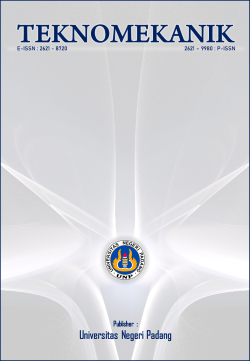Analysis of the factors that affect employee turnover intention at Travelodge Hotel Batam
DOI:
https://doi.org/10.24036/jptk.v3i4.14123Keywords:
Factor Analysis, Turnover Intention, Employee, HotelAbstract
The study aims to determine the analysis of factors influencing Turnover Intention employees at Hotel Travelodge Batam.This research is a quantitative descriptive type with a factor analysis method aimed at seeing the factors affecting Turnover Intention in the Hotel Travelodge Batam. The population in this study is all employees amounting to 52 people, the sample in this study is with non-probability sampling technique with a total saturated sample of 52 people. Data analysis techniques using SPSS version 16.00. The results of this study showed a simple linear regression hypothesis test obtained F 5,418 with sig. 0.000 < 0.05, then the variable factors that influence can explain the turnover variable intention employees significantly, with the value of R Square of 0.419. This means that the factors influencing the turnover of intention employees by 41.9% and 58.1% are influenced by other factors. The salary factor has no significant effect on turnover intention. Training factors and work facilities have no significant effect on turnover intention. Leadership factors have no significant effect on turnover intention. The award factor has significant effect on turnover intention. The organizational culture factor has no significant effect on turnover intention. Job satisfaction factor has no significant effect on turnover intention. Based on the results the research researchers suggested to pay more attention to factors that influence employee turnover and further improve job satisfaction, training and work facilities,.
Downloads
References
Abraham H. Maslow, 2010, Motivation and Personality.Rajawali,Jakarta
Forendes, Nindi. Arif Adrian, and Adek Kurnia Fiza. 2020. “Pengaruh Fasilitas Kerja Karyawan Terhadap Turnover Intention di Imelda Hotel Waterpark-Convention Padang.” Jurnal Kajian Pariwisata dan Bisnis Perhotelan 2(1):96–100. https://doi.org/10.24036/jkpbp.v1i2.9172
Griffeth R W. PW, Hom and S. Gaertner. 2010. A MetaAnalysis of Antecedents and Correlates of Employee Turnover Update, Moderator Test and Research Implication fort the Next Millenium. Journal of Management. 26 (3): 463-488.
Harris, Christopher M., James J. Lavelle, and Gary C. McMahan. 2020. “The Effects of Internal and External Sources of Justice on Employee Turnover Intention and Organizational Citizenship Behavior toward Clients and Workgroup Members.” The International Journal of Human Resource Management 31(17):2141–64. https://doi.org/10.1080/09585192.2018.1441163
Hasibuan, Malay. 2011. Human Resources and Management. Revised Edition. Jakarta: Earth Literacy.
Kim, N. (2014), Employee Turnover Intention Among Newcomers in Travel Industry. Int. J. Tourism Res., 16: 56-64. https://doi.org/10.1002/jtr.1898
Mathis Robert L. and John H. Jackson. 2009. Human Resource Management: Salemba.empat
Mobley,WH2012. Substitution of Employees: Causes,Effects and Control. Translate. jakarta:PT Pustaka Binaman/Pressindo.
Rivai, Veithzal and Sagala, Ella Jauvani. 2011. Human Resource Management for Companies: From Theory to Practice. Jakarta: PT Raja GrafindoPersada.
Sabuhari, R., Sudiro, A., Irawanto, D & Rahayu, M. (2020). The effects of human resource flexibility, employee competency, organizational culture adaptation and job satisfaction on employee performance.Management Science Letters , 10(8), 1775-1786.
Sedarmayanti. 2011. Work Procedure / and Work Productivity.Bandung,Mandar/Advanced
Sunyoto, D. (2012). Management / Resources / Human, mold 1. Yogyakarta: CAPS.
Sugiyono. 2013. / Quantitative,Qualitative and R&D Research Methods. Alphabet.
Wibowo.2013. Performance Management, 3rd edition. Jakarta,/Rajaweali press.
Downloads
Published
How to Cite
Issue
Section
License
Copyright (c) 2021 Ulfa Ulfa, Youmil Abrian, Arif Adrian

This work is licensed under a Creative Commons Attribution 4.0 International License.





